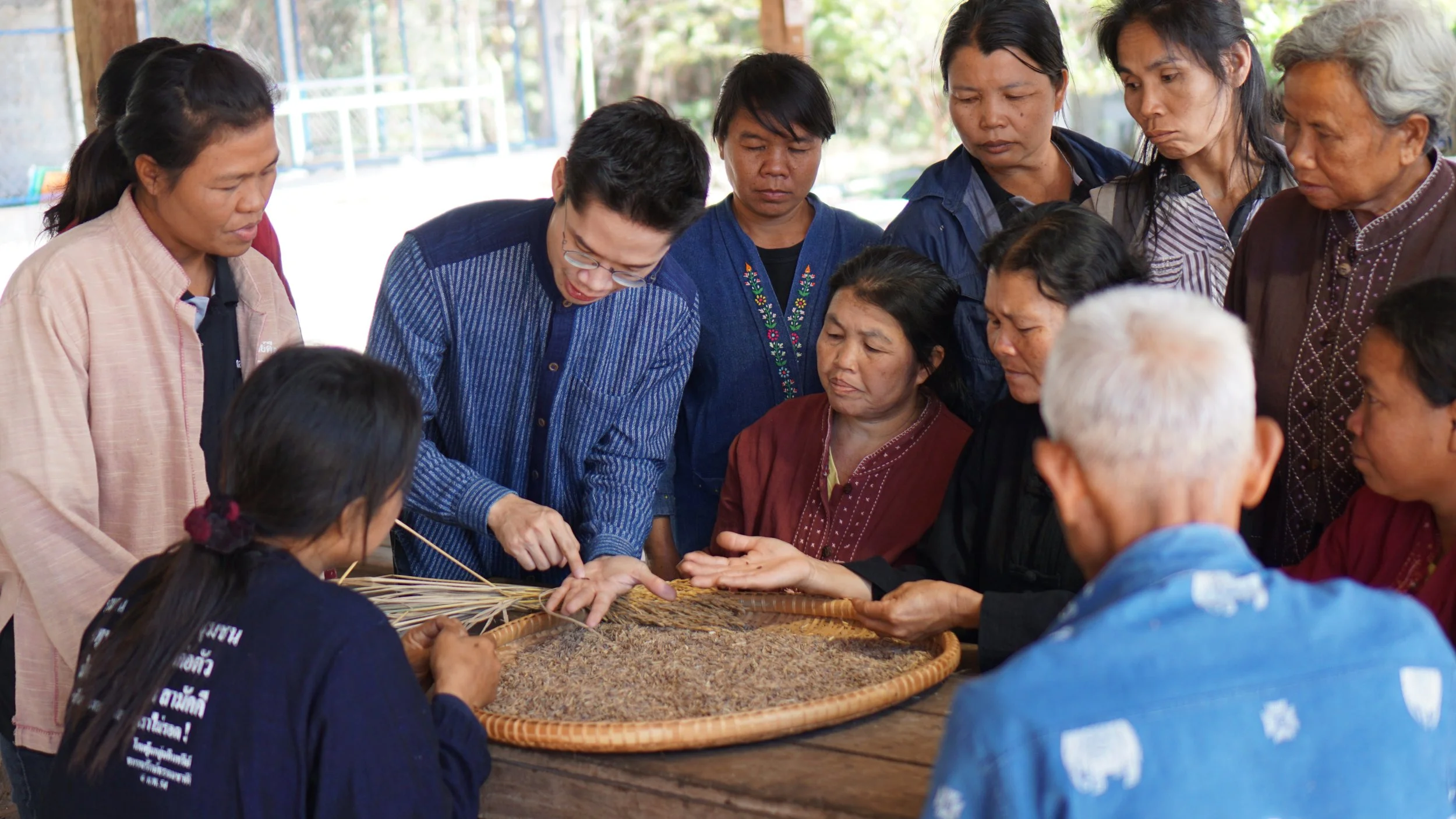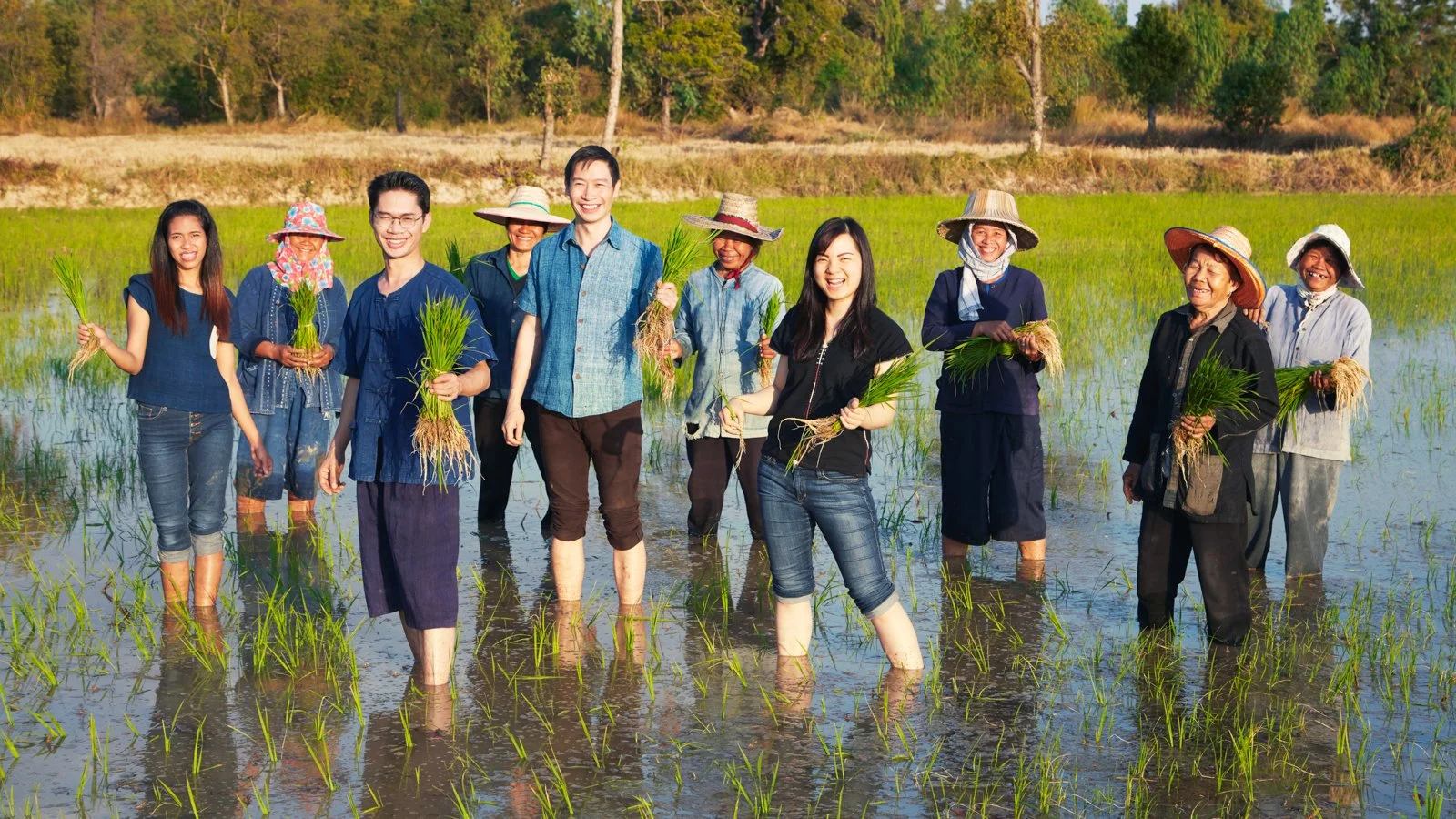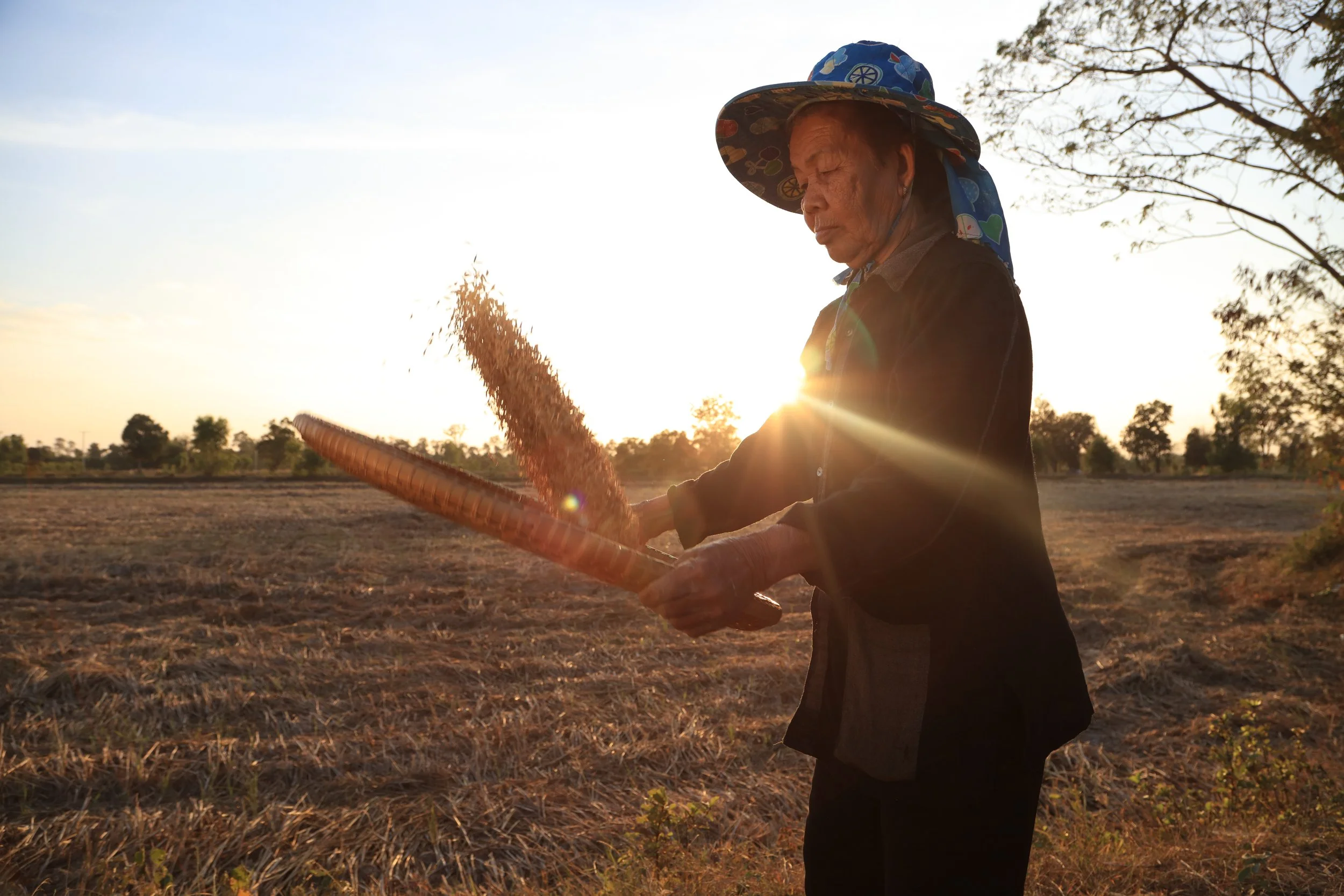Peetachai Dejkraisak On Values Led Partnerships Lifting Thai Farmers From Poverty
Peetachai “Neil” Dejkraisak is a CEO and Co-founder of Jasberry Co., Ltd., Jasberry is a social enterprise that solves the problem of farmers' poverty through innovative organic products with a global appeal, starting with Jasberry® Superfood rice.
Jasberry currently works with over 2,500 small-scale farmers households in the Northern part of Thailand helping them to increase their income by several folds through transforming the food system that benefits the consumers, farmers and planet.
Jasberry has been recognised globally for its third-party verified social impact, some of the highlights include:
First certified B-Corp food company in Thailand
Neil is an Unreasonable Fellow. Unreasonable is an organisation and private global network dedicated to supporting entrepreneurs positioned to bend history in the right direction.
Neil was awarded the Meaningful Business 100. Recognised as 1 of the 100 inspirational global leaders that combine purpose and profit to make meaningful changes in the world to help achieve the United Nations SDGs.
Peetachai discusses building a market-driven, regenerative food brand to end smallholder poverty in Thailand, why every decision must benefit consumers, farmers and the planet, and how partnerships and impact finance unlock global scale.
Highlights from the interview (listen to the podcast for full details)
[Indio Myles] - To start off, can you please share a bit about your background and what led you to social entrepreneurship and to becoming associated with Jasberry?
[Peetachai “Neil” Dejkraisak] - In a nutshell, I moved to Australia when I was 14. I was born in Thailand, so I had the fortunate opportunity of going to another country and learning English.
At the time (I suppose this is my origin story) I was 16 years old, studying at Canberra Grammar School. We were taking an excursion to the Sydney Opera House, and were on a bus.
I was with my best friend, Duncan. We were 16, sitting together, and I asked him, “What do you want to do when you grow up?” He said, “I want to go to Africa and start a school for underprivileged children.”
He asked me, “What do you want to do, Neil?” I said I wanted to go back to my country and work in forest conservation to protect the rainforest in Thailand.
One of my heroes growing up was a conservationist who got a scholarship to England, came back to Thailand, and worked in forest conservation. At the time, a lot of illegal logging was happening, and because of his work he prevented this.
Some of his staff were killed, his family was threatened, and one day, he wrote a letter and then shot himself. That letter started the biggest environmental movement in Thai history, and we now have the largest protected rainforest area in Southeast Asia because of him. He inspired me as a kid.
Fast forward 10 years after that school bus excursion: I was an investment banker at 26. Deep down, I wanted to work with impact, but I was still finding my way in the world. One day I received a school newsletter (I never usually read them), but for some reason I read that particular one.
This was before Facebook. I saw an interview, and there was Duncan, the same guy with the blonde hair. I started reading, and the photo was of him surrounded by African children. I realised he had followed his dream.
That was something we had shared 10 years earlier, and so I quit my job the next day. That eventually brought me here to start Jasberry, fulfilling a promise I made to a friend a long time ago.
As CEO and co-founder of Jasberry, could you share with our audience how this social enterprise is transforming food systems and benefiting farmers, the environment, and consumers?
Jasberry, in a nutshell, is what we see as the Patagonia of food, but really it’s a symbol for transformation. When I started Jasberry, it was to tackle the problem of farmers’ poverty.
At the time, Thailand was the world’s number one rice exporter, and yet our farmers were among the poorest in the world, earning just 40 cents per day. This is around six times below the poverty line, and that represented 25% of the country, or 17 million people.
For us, the goal was to create a sustainable and scalable solution to solve that poverty. Jasberry is the vehicle for this change. We thought that if we could create a world-class brand with innovative, organic products, we could transform the food system. I believe a sustainable and scalable solution must come from the market. We couldn’t rely on the NGO model, which depends on funding and donations.
Instead, we wanted to build a social enterprise with a very strong business model that combines three key components: the consumer, the farmer, and the planet.
If we could maximise impact across all three, making consumers healthier, helping farmers rise out of poverty, and using regenerative farming to heal the planet, we could transform the whole system. Jasberry became the representation of that vision.
Looking more closely at the work of Jasberry, you’ve partnered with over 2,500 small-scale farming households. What strategies have you found most effective in creating economic prosperity for these communities?
That is a more complex question, because normally when we talk about prosperity in a farming context, you look at yield, cost, and farmers’ income. The result is that we’ve helped increase farmers’ income from just 40 cents a day to almost $6 a day, a fourteen-fold increase. That impact reaches 2,500 families, or over 12,000 people.
At the heart of it, for the first three years of this project I was living with the community. I stayed in farmers’ homes and worked in the fields with them to truly understand how the community operated, because poverty was systemic. To solve it, you had to understand how that system worked. Much of what we built as a business model came from the community itself and from our lived experience with them, not just from studying them.
There’s a big difference. That immersion allowed us to scale more easily over time, because we understood how farmers think, what they could do, and what they could not do.
I would also say that while a social business model must increase economic conditions, it cannot break the cultural fabric. As we say in Thailand, “rice is life.” It is so deeply intertwined with farmers’ lives. They grow rice for subsistence, to eat first, not to sell.
Even the concept of saying, “you’re going to make 300% more income,” was alien to them. By understanding that, we were able to build a model that combined both: living their traditional way of life, while introducing an innovative crop that represents the future of food.
How are you ensuring sustainability is embedded across your entire product supply chain, particularly as you deliver to a global market? How do you look at that supply chain and ensure those impacts are being made?
We ask three questions almost at every decision point: is this good for the consumer, the farmer, and the planet? If the answer is no, we don’t do it. If the answer is yes, then we work out the economics afterwards.
For example, our main product is called Jasberry Superfood Rice. It’s a high-antioxidant, gut-healthy rice, fully organic. As we developed this into ready-to-eat formats, we also began creating superfood ramen and other products that are now available in markets like the US, Germany, the UK, New Zealand, and Singapore.
At every stage we first ask: is this product going to make people’s lives healthier? Is it delicious and nutritious? Is it truly the best? Then we look at the farmers and the system in which they grow the rice. We support them with training, seed production, and everything they need to improve yield. For the planet, we use regenerative agriculture and measure soil health. These are what I call the non-negotiable elements of Jasberry. They are the principles of our brand.
Only after this do we look at the pricing structure. What price can consumers afford to pay? Because we also want to keep our products accessible.
I’ll give you an example. Whole Foods in the US is the largest organic retailer. When I first approached them, people warned me it was too expensive to do business with them. But I went anyway and said: “This is the best rice in the world, and it’s going to transform people’s lives, for consumers, farmers, and the planet.” They loved it. Then they asked, “Okay, so what’s the price?”
I told them, “From my research, consumers are willing to pay $4.99 for this product. For that to work, these conditions have to be met.” The margin I offered Whole Foods was actually lower than what everyone had warned me about. People said, “Don’t even bother offering that to them, they’ll say no.”
I told myself, if by them taking an extra 3% margin it would crush the farmer, then I wanted them to at least say that to me directly. With a smile, I could accept rejection, but I needed to give them the information. Credit to Whole Foods, they said, “For your brand, we are willing to do this, because we really care.”
I feel a lot of gratitude to Whole Foods for that decision. They are still making plenty of money, because they operate on large margins, but in that moment they chose to take a few percent less so that farmers could benefit.
In the end, I think you have to stand for what you believe in and communicate that clearly to all stakeholders and partners. This is how we operate, and this is why. The moment we compromise those values, the system breaks. When we are creating a win-win-win system, where consumers, farmers, and the planet all benefit, it means leaving behind the old win-lose system, where one or two companies win a lot while everyone else loses.
Transitioning into a win-win-win model means some stakeholders may win a little less, but it’s for the greater good and the long term.
I believe this is how business should operate in the future. One of my motivations is to make Jasberry become like Patagonia, so that one day people can look at it and see that it is a viable, sustainable business model.
Is there anything else about Jasberry’s approach that you think is particularly unique as a social enterprise?
It’s funny, because when people ask me what business I’m in, they often assume I sell rice. I say no, I’m not in the business of rice. It’s like asking the founder of Starbucks what business he’s in. He would say he’s in the business of service, not coffee.
There’s something powerful in that distinction. One of my mentors once sent me a letter written by Phil Knight, the founder of Nike. He wrote it in his garage before Nike even existed, and it laid out about 10 principles. None of them were about shoes. My mentor said, “Why don’t you do a Jasberry letter?”
The first principle I wrote down was: our business is about what it means to be human. We nurture what it means to be human. That may sound intangible, but it is at the core of how we operate. We ask the human question first. If our partners or stakeholders aren’t aligned with that approach, we don’t work with them.
Yes, we can talk about the business model, margins, or pricing structures—but without humanity, people are treated like disposable objects, and that is not what Jasberry stands for.
For me, it’s critical to understand your principles and translate them into execution within your business. You must do what you say. Having a strong DNA as a brand, knowing what you stand for beyond making money. That’s your North Star. We have a clear North Star, and we are relentless in pursuing it, even if it means facing a lot of rejection along the way.
From your perspective, are there significant opportunities for social enterprises to reshape or lead the global food industry in the coming decade?
Food is close to all of us. It crosses every culture because we all eat every day, and the world is more globalised than ever.
When you look at the issues tied to food production, poverty, environmental degradation, and the fact that agriculture is the largest producer of methane gases globally, you can see why governments, NGOs, and private companies are spending billions and trillions of dollars to combat these challenges. This is exactly where opportunities exist for social enterprises.
At the same time, consumers are becoming more health-conscious than ever. They care deeply about what they put into their bodies and where it comes from. If social enterprises can understand how to address different issues across the food value chain, the opportunities are immense. Whether at the farm level, production level, or brand level, there is so much potential.
I’ll give you an example. I recently met a US coconut company that imports five containers of coconuts every single day. That’s literally half a million coconuts daily. Why mention this? Because they told me, “We have so much coconut waste, and we don’t know what to do with it.”
I mentor one social entrepreneur who has developed a way to convert coconut waste into biodegradable fertiliser. What was once seen as a problem is now something valuable for the earth. This is just one example.
The opportunities are endless, even at a large scale. As food becomes more globalised and production continues to expand, the amount of by-product will only increase. That presents huge opportunities for the environment. At Jasberry, we often say we are creating food for the future. We ask: what will food look like 10 years from now? That guiding principle ensures that what we produce today remains relevant 10, 20, or 30 years from now.
Take coconut waste, for example. It isn’t going away. It will continue to accumulate, often ending up in landfill, which in turn creates more environmental issues. In fact, companies already pay significant amounts just to dispose of waste. So even before you create a new product, you can be paid simply to remove it—let alone when you find ways to transform it into something useful.
If you look deeply enough into the food system, there is so much that we are doing today which is not sustainable. As social entrepreneurs, we have the ability to find solutions to these problems, and that’s where the real opportunity lies.
You’re going to be an upcoming speaker at the Social Enterprise World Forum in Taipei later this year, on the 29th and 30th of October. What are you most looking forward to about this event?
Partnerships are crucial. I asked the organisers for a list of participating organisations, and then had my team research every speaker. They mapped out who I should meet, who I should talk to, and how we might collaborate. At scale, partnerships are essential. To scale impact, you need partners.
When we talk about social entrepreneurship, one of the things I always champion at these kinds of conferences is financing. Without impact financing, the sector simply won’t grow. The challenge is that we have so little understanding of what true impact financing looks like. Most financing models have been developed for private equity or tech, but social entrepreneurship is very different, and the financing knowledge here is lacking.
That’s why I use these conferences as an opportunity to align impact investors with social enterprises and commercial partners. We really need each other in order to grow. When those connections happen, they benefit everyone. The missing piece, and the biggest struggle for most social enterprises, is access to funding.
There’s definitely a link between early-stage financing and enabling enterprises to explore partnerships. If you’re not worrying about core operational requirements, then you can branch out and explore those opportunities.
I think that’s critical. I mentioned earlier the example of Jasberry going national with Whole Foods. That’s a huge deal involving over 500 stores. People said to me, “You’re going to need millions of dollars just for marketing.” I thought, “I’m going to go bankrupt already!” They really tried to scare me.
Of course, it does cost money to enter a retailer of that scale. But ultimately, you need the right kind of financing to execute a deal like that. Imagine going to Whole Foods, they love your product, and you say, “Great, let me sell it to you, but I have no working capital.” It doesn’t work. They’re not going to pay you in advance.
To your point, the operational backbone (which is largely financing) has to be there. Without it, you simply can’t execute the kinds of partnerships that will scale your impact.
Is there any key piece of advice you would give to changemakers or aspiring social entrepreneurs who want to build a purpose-led business and figure out how to deliver impact?
I like an African proverb that says, “If you want to go fast, go alone. If you want to go far, go together.” For me, the key is having a team. At Jasberry we say we want to build a world-class brand like Patagonia. What do we need to achieve that? A world-class team.
One piece of advice I often share is this: hire people for who they are, not what they know. Too often, organisations hire for skills but fire for character. The kind of people who will help you come up with creative solutions to the most complex social and environmental challenges are rare. You need great people. You need people who are driven, hungry, motivated, kind, and persistent. With a team of people like that, you’ll be unstoppable.
The hardest challenge for many social entrepreneurs is they think, “I don’t have the budget to hire the top talent who would normally go to Netflix or a big company.” But you have something more powerful: purpose. Why are you here?
I ask everyone who applies to Jasberry: “What would you want to accomplish here that would be the best work of your life, something you’d be proud of when you leave this place?” If they can’t answer that, they’re probably not the right fit.
The magic happens when personal purpose aligns with organisational purpose. At that point, people aren’t just working for your enterprise, they’re fulfilling their own dream. That’s unstoppable.
I also remind social entrepreneurs that not everyone has to become a business owner. You can work with other social enterprises and scale impact together, rather than starting lots of very small organisations that lack the resources to make a difference.
At Jasberry, many of our team members are actually business owners themselves, working part-time with us. We are creative in structuring our team. Maybe we can’t pay what Netflix would pay, but we can offer purpose and flexibility. That way, everyone gets to do what they love while contributing to our shared vision.
Ultimately, building a culture based on purpose and understanding people as humans goes a long way. Because you can’t do this alone, you need great partners and a strong team beside you.
What inspiring projects or initiatives have you come across recently creating a positive change?
I love Saturday School, which is a social enterprise here in Thailand. It provides education to underprivileged children, but more importantly, once those children reach a certain level, they return to their own communities to teach and support others.
It’s essentially a network of professionals and volunteers who come together to reach small, often remote communities across the country. Their model makes education accessible even in upcountry areas far from major cities.
What I admire most is that they are building humans and creating opportunity through access to knowledge and education. With technology becoming so essential today, but not always taught in schools, Saturday School also equips young people with those vital digital skills.
To finish off, what books or resources would you recommend to our audience?
I recommend Delivering Happiness by Tony Hsieh, the founder of Zappos. The book is about how to create the best workplace culture, one that combines purpose with joy and happiness.
I come back to the importance of team, because that’s where your real superpower comes from. Your ability to grow is only as strong as the ability of your team. Many social entrepreneurs are brilliant individually, but when it comes to building a team, things often fall apart.
This book provides a valuable framework on how to build a team and create a culture that supports both growth and purpose.










